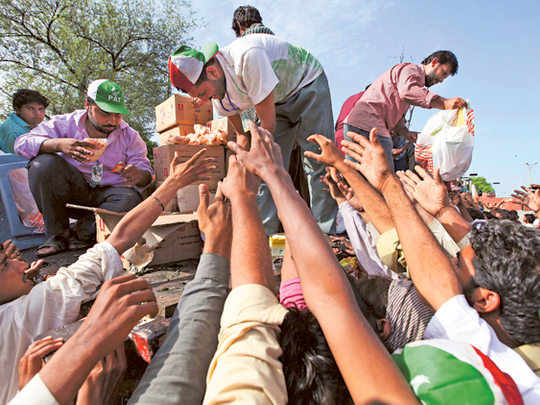
Islamabad: Thousands of opposition demonstrators crowded the streets of the Pakistani capital for a second day on Sunday, after a populist cleric issued a 48-hour ultimatum demanding the arrest of Prime Minister Nawaz Sharif.
The ultimatum came as protesters led by cleric Tahir-ul-Qadri and cricketer-turned politician Imran Khan converged on Islamabad from the eastern city of Lahore to press their demands.
Security in Islamabad has been ramped up, with some 30,000 police and other security forces on the streets.
The government has agreed to allow the two groups to hold rallies but many streets have been blocked off with shipping containers to protect sensitive areas.
Khan on Saturday called on Sharif to step down, lashing out at a government he claims won power fraudulently in last year’s general election.
Khan was due to outline his party’s demands to the government during an address to protesters on Sunday afternoon, Shireen Mazari, a spokeswoman for his Pakistan Tehreek-e-Insaf party, said.
“We will not go back until all our demands are accepted,” Khan said earlier, calling for all the officials involved in alleged vote-rigging to be tried for treason.
Late on Saturday he also warned Sharif to resign, saying his supporters would otherwise enter on Sunday the capital’s high security Red Zone where top government buildings and embassies are located.
The May 2013 general election saw Sharif take power in a landslide, and international observers who monitored the polls said they were free and credible.
The demonstration is the culmination of a “long march” — in reality a motorised cavalcade — that set off on Thursday from Lahore, around 300km away, to try to topple the government.
‘Don’t derail democracy’
Qadri has already called for Sharif’s arrest over what he alleges was the murder of his supporters, and for the installation of an interim national government.
The cleric, who late on Saturday issued a 48-hour ultimatum to the government to accept his demands, said he would not be responsible for any repercussions if they were not met.
He said Sharif and his younger brother Shahbaz Sharif, who is chief minister of the largest province of Punjab, had no right to sit in government, their cabinets should be dissolved and they should be arrested on murder charges.
On June 17, 10 workers of Qadri’s Pakistan Awami Tehreek movement were killed in clashes with police at his headquarters in Lahore. A judicial commission was formed to investigate.
Analysts warned there was no quick solution to the impasse.
“Apparently there are no signs that the government and the two parties are working towards a solution of the problem... both are sticking to their positions, leading to a deadlock,” analyst Hasan Askari said.
“If political leaders fail to resolve this problem and violence starts, then the initiative will shift to the military — either to mediate the problem or see to it that the stalemate is resolved,” he said.
“This will further increase the military’s clout in Pakistan”.
Senior politicians have intensified efforts to avert a crisis.
Siraj-ul-Haq, chief of the religious Jamat-e-Islami party, met the opposition leader in parliament’s lower house, Syed Khursheed Shah, to discuss the situation.
“The entire nation is upset over what is happening in Islamabad... we have to steer the country out of this crisis with a cool mind,” Haq told reporters after meeting Shah in Karachi.
“I am going to Islamabad on Monday where I will hold further consultations with other politicians,” he said but added, “We will not allow democracy to be derailed at any cost.”
Shah, who is also a senior leader of Pakistan Peoples Party, said: “Our survival lies in upholding democracy and the constitution. We all have to sit together to find an amicable solution to the problem.”












